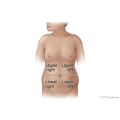Nonalcoholic Fatty Liver Disease (NAFLD)
Condition Basics
What is nonalcoholic
fatty liver disease (NAFLD)?
Nonalcoholic fatty liver disease (NAFLD) is the term for conditions in which fat builds up in the liver in people who drink little or no alcohol. In the most common type, nonalcoholic fatty liver, the liver fat doesn't seem to cause damage. The more serious type, NASH, may lead to cirrhosis and liver failure.
What causes it?
Experts don't know why some people get a buildup of fat in their liver and some don't. They do know that NAFLD is often linked to a group of health conditions called metabolic syndrome, which includes:
Most people who have NAFLD also have one or more of these health problems. But NAFLD can occur in people who have none of these conditions.
What are the symptoms?
Most people who have NAFLD have no symptoms. Even people who have the more serious type called NASH may not have symptoms for many years. When symptoms occur, they may include feeling very tired. Or you may have pain or discomfort in the upper right part of your belly.
How is it diagnosed?
Your doctor will ask about your past health and any symptoms and will do a physical exam. The doctor may also do tests. For example, you may have:
Testing can help the doctor rule out other possible causes of fat in the liver. These include heavy alcohol use, certain medicines, and other liver diseases.
A special type of ultrasound or MRI may be done to see if a liver biopsy is needed. In a liver biopsy, a sample of liver tissue is removed and sent to a lab. A liver biopsy can show if you have scarring or the more serious type of NAFLD called NASH.
How is NAFLD treated?
Treatment focuses on managing related conditions like diabetes and making lifestyle changes, including losing weight if needed, eating a healthy diet, and being more active. A doctor may prescribe medicines for related conditions or to help with weight loss. Weight-loss surgery may be an option for people who have obesity.
Credits
Current as of: October 19, 2023
Current as of: October 19, 2023



